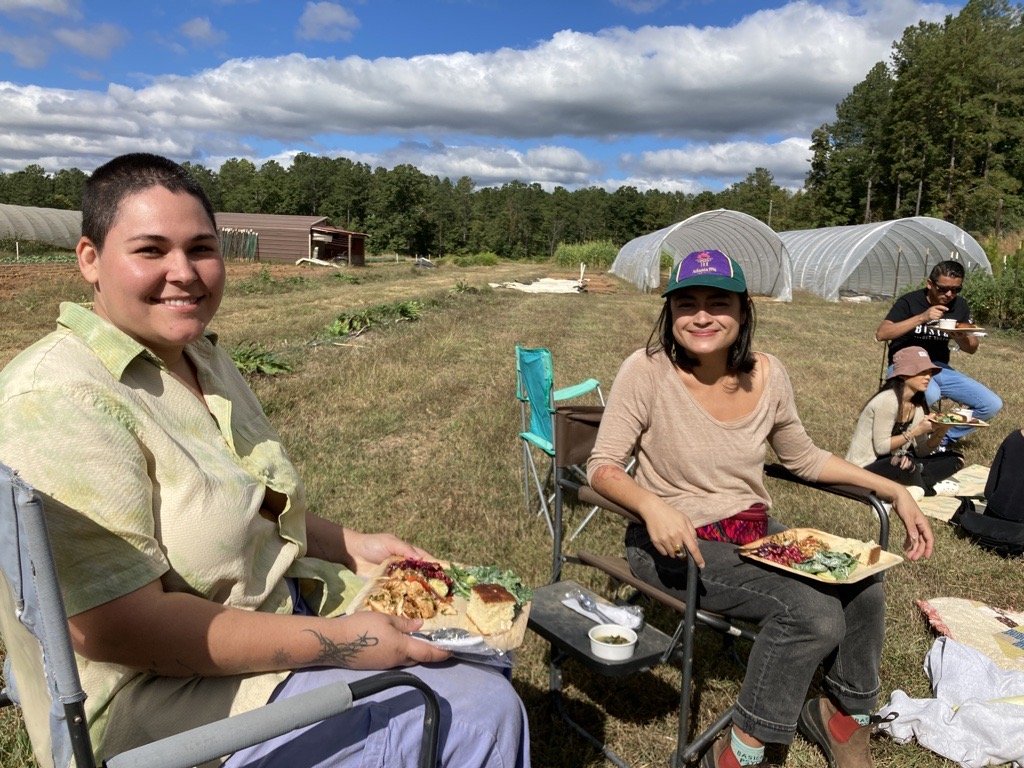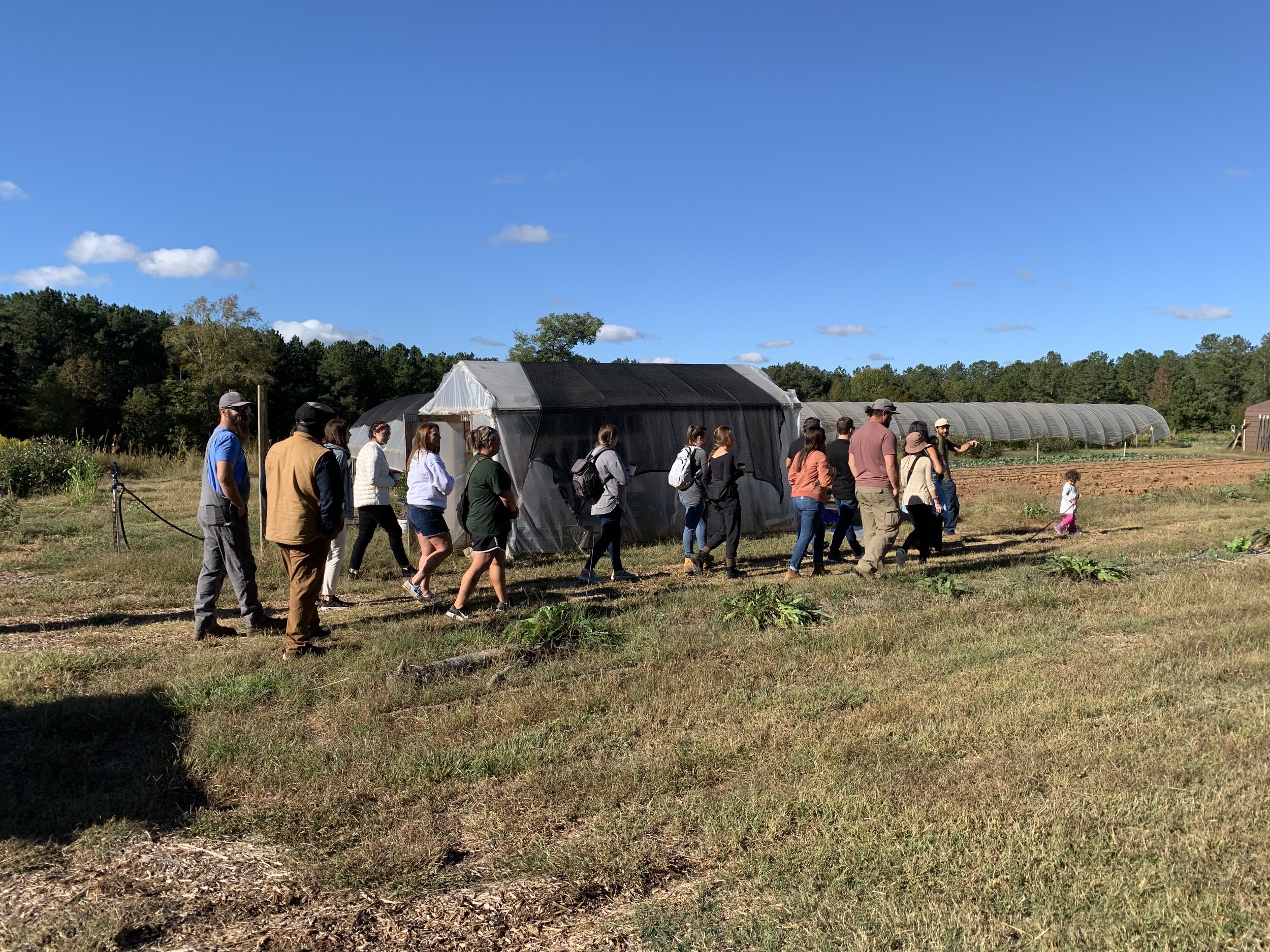We have some spicy spoilers up ahead! We’re sharing some planting tips to help you get a head start on October Farm to School Month 2023.
Georgia Organics Conference Recap: Community Collaboration Session on the Use of Storytelling to Improve Social Awareness, Grow Leaders, and Foster Belonging in a School Setting
By Yaza Sarieh
Yaza Sarieh is the Georgia Organics Community Collaboration Coordinator.
Active Inclusion Session - Photo by Jenna Shea Photojournalism
In mid-February, the annual Georgia Organics Conference & Expo created space for community members to learn from each other and reinvigorate impactful connections at the Perry National Fairgrounds. On a rainy Thursday morning, the Community Collaborations track kicked off with a session titled: Active Inclusion – How telling our collective stories improves social awareness, grows leaders, and fosters belonging in the community, facilitated by Sagdrina Jalal, Founder of SageD Consulting, and Rukia Rogers, Founder of the Highlander School of Atlanta. This interactive workshop provided participants with tools to help them transition from an understanding and commitment to diversity, equity, and inclusion to implementing strategies that support the changes they desire.
Sagdrina Jalal - Photo by Jenna Shea Photojournalism
Rukia Rogers - Photo by Jenna Shea Photojournalism
Both Sagdrina and Rukia are Social Justice Activists and Educators with extensive experience supporting leaders to develop their impact through the use of storytelling and authentic engagement. They started the experience with a commemoration and acknowledgment of the Muscogee tribe and African American slaves who were stewards of the land that we occupy. This reflection transitioned into a discussion about mission-driven programming, using The Highlander School of Atlanta as a case study.
One of the core principles of the Highlander School’s mission is that children are “active discoverers and constructors of their own knowledge,” and that “they have the right....to be a part of the decision-making process.” To fulfill this mission, Rukia talked about how the school must constantly and rigorously reflect on the ways their mission and values are present in daily activities. For instance, when students encountered an unhoused person asking for food, they started to ask questions, and expressed a desire to help enhance food equity in their community. Educators allowed the students to take the lead, and so they made bowls for unhoused people to eat from, and they inspired the creation of a community garden accessible to everyone in need. This is just one example of how stories can reflect and communicate the values and missions of an organization in meaningful, tangible ways.
The Highlander School - Photo by SageD Consulting
The example of the Highlander School was a segway into the interactive portion of the Active Inclusion workshop. For this portion of the session, Sagdrina used her background as the Founder of SageD Consulting to coach participants on effective messaging of their missions. Sagdrina emphasized that effective messaging cultivates community-centered networks and amplifies diverse voices. Some of the factors she encouraged participants to consider were adapted from the Anti-Racist Farmer’s Market Toolkit and include:
Who are the sponsors, partners, and collaborators?
What are those partner organizations’ values?
Where does your organization advertise? What are the advertisers’ values?
Does the organization have community partnerships that benefit the most vulnerable members of the community?
These questions are crucial for communicating the message consistently, and ensuring that it represents and resonates with the intended audience. Session participants then engaged in a small group campaign activity to create messaging campaigns that related to a shared topic and values. This learning opportunity proved to be a strong start to the conference, as participants collectively practiced how to promote healing, belonging, and equity in this setting and beyond.
Interactive Activity - Photos by Jenna Shea Photojournalism
To learn more about Georgia Organics, visit georgiaorganics.org and follow us on Facebook, Instagram, Twitter, and LinkedIn by searching the handle @GeorgiaOrganics or Georgia Organics.
To learn more about SageD Consulting, visit www.sagedconsulting.com, or follow them on Facebook, Instagram (@sagdrina), and LinkedIn.
To learn more about The Highlander School, visit www.thehighlanderschool.com, or follow them on Facebook, Instagram (@rukiarogers), and LinkedIn.
Sourcing Local Table Talk at Levity Farms, Georgia Organics hosts Farmer-Buyer Mixer
By Kimberly Koogler
Kimberly Koogler is Georgia Organics’ Community Collaborations Manager.
Crops in Season during Buyer Farm Tour at Levity Farms (@levityfarmsga)
On a recent Monday morning, I got to find out what the best way to start a new week is. It is definitely getting together with Georgia farmers, chefs, and early childhood educators on a gorgeous day at a beautiful farm to meander about and then enjoy a locally sourced lunch under a heavenly October sky.
Why might you find six farmers, three early childhood educators, and nine restaurants, caterers, and pop-up chefs gathered together on a Monday morning? To nerd out about local sourcing, of course!
It was our first time doing an event like this, and it unfolded so beautifully that we look forward to doing more of its kind. Our Farmer Champion team--comprising Lauren Cox, Farmer Services Director; Kayla Williams, Farmer Champion Senior Coordinator; Kimberly Della Donna, Community Collaborations Director; and myself—called this delightful convening. We did so because all the above-mentioned parties in attendance have in common a desire to serve up fresh, nutritious, delicious, local food to their community and to grow a resilient local food system in so doing.
Represented in this photo: Bistro Off Broad, A Kid’s World, Hearts of Harvest Farm, The Expat, Bread and Butter Farms, Puma Yu’s, Georgia Organics Staff, Ry’s Table, Slater’s Steakhouse, and Levity Farms)
So, we got together at the beautiful Levity Farms in Madison, GA, exchanged insights and ideas, and shared an exquisite lunch catered by the local Hallie Jane’s Catering, who sourced much of the produce from Levity Farms!
Georgia Organics’ Kayla Williams and Lauren Cox
Local sourcing talk over lunch!
Our gracious farmer hosts, Zach and Ilana Richards took us on a tour, told us their story, and showed us how they build and maintain healthy soil and where they are in their progress towards a closed-circuit, regenerative farming operation.
Everybody shared what it is they look for when starting a new purchasing relationship and what is most conducive to maintaining those relationships. Farmers talked about what helps them when working with chefs; chefs talked about what helps them serve more locally grown food on their menus; and our ECE representatives talked about the challenges of sourcing the volume of food needed to feed many kids multiple meals on a daily basis and the opportunity to plan ahead. While everyone in the room could probably use more time and help, nobody was lacking in passion, care, and respect for each other and each other’s work.
KEY TAKEAWAYS
Consistency and communication!
For farmers:
Send updated availability lists and/or check in consistently.
Also, let your buyers know what’s coming up soon, and try to give them an idea of how long you’ll be able to offer different items on your availability list.
For buyers:
Consistent ordering: When farmers know they can count on a regular order for you, they will grow for you.
Consistent communication: This is key to building trust and a solid relationship.
Provide your farmers feedback on their product. They want to make you happy!
Cultivating personal working relationships
“Community connection makes what we do magnetic.” So well said by Ilana Richards of Levity Farms!
Build a symbiotic relationship.
Check in with each other.
Planning ahead helps everyone!
Take some time to plan together and understand each other’s expectations. This helps chefs plan menus and gives farmers more information about what’s in high demand while they’re planning their season.
Some purchasing relationships, like those between farmers and ECE providers might benefit from drawing up a simple contract.
Georgia Organics’ Farmer Champion program works to bring local farmers, chefs, and aggregators together to increase sustainable and organic purchasing by Georgia restaurants, caterers, pop-ups, and early childhood education centers. By connecting farmers to these purchasers and eaters to these businesses that source responsibly, our local food system’s diverse patchwork of small and organic farms will grow and thrive. If you’re a buyer interested in learning more, please reach out to Kayla Williams at kayla@georgiaorganics.org and/or Kimberly Koogler at kimberlykoogler@georgiaorganics.org.
To learn more about Levity Farms, visit www.levityfarms.com or follow them on social media at facebook.com/levityfarms and/or on Instagram at levityfarmsga.
To learn more about Georgia Organics, visit georgiaorganics.org and follow us on social media @GeorgiaOrganics and at facebook.com/GeorgiaOrganics.

















